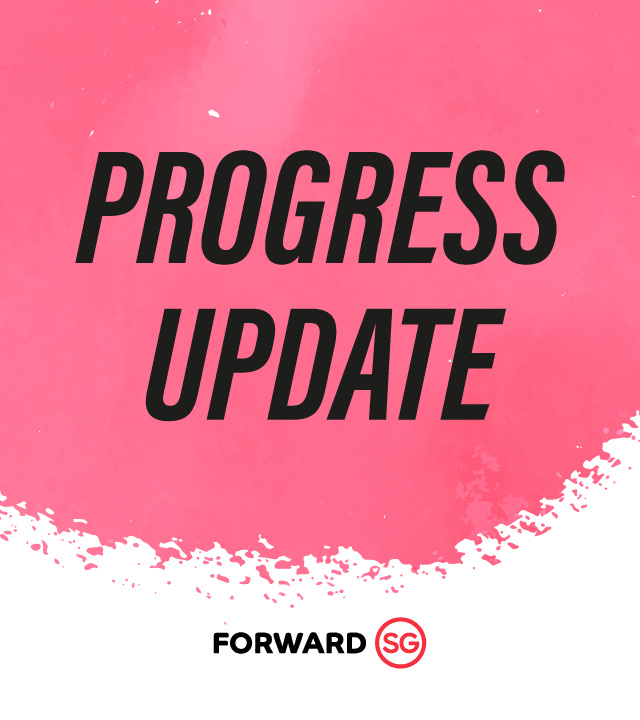
► Empower: Economy and Jobs
► Equip: Education and Lifelong Learning
► Care: Health and Social Support
► Build: Home and Living Environment
► Steward: Environmental and Fiscal Sustainability
► Unite: Singapore Identity
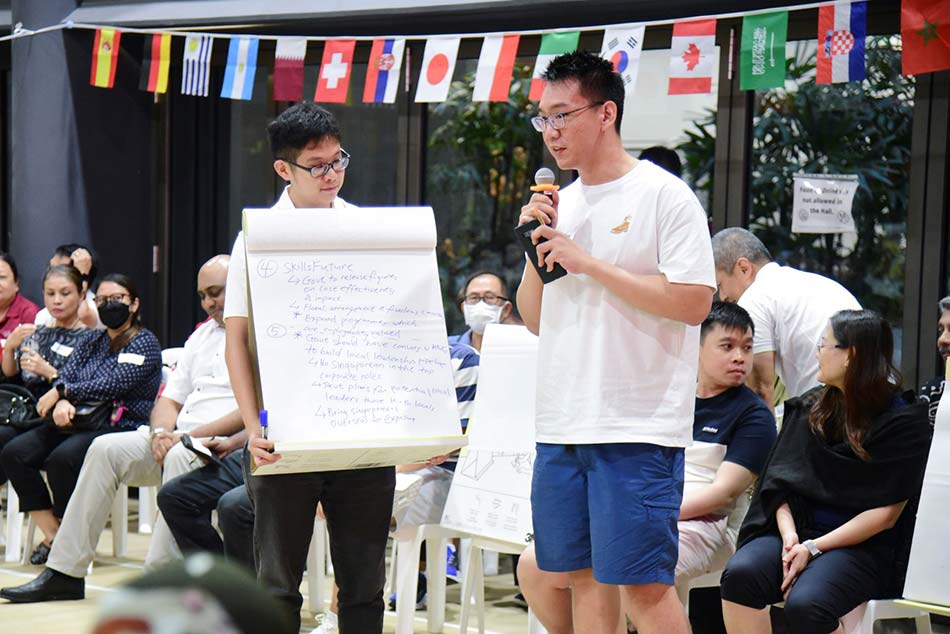
A participant sharing his views at a locale engagement session

Empower: Economy and Jobs
Concerns on the economy and job opportunities
1. Singaporeans shared their concerns about staying relevant and competitive in today’s economy, and having sufficient job opportunities that match their aspirations.
2. They believe that employers should provide a conducive work culture and environment. They also felt that the Government should strengthen employment frameworks and support employers in improving hiring and workplace practices.
Strengthening local leadership development
3. Many younger Singaporeans expressed interest in working overseas, and wanted relevant training opportunities that would help them advance their careers and emerge as leaders in the corporate sector. They also voiced difficulties in aligning their desire to pursue overseas career opportunities with other life goals and family responsibilities.
|
“In the next five years, I want to diversify my exposure across markets and products… I am open to being a manager or going overseas, depending on opportunities that come up.”
– Junior management associate at engagement with management associates on jobs and the economy, 7 Oct 2022 |
Taking ownership of career health
4. Many participants called for greater support from employers such as resources, career guidance and advice, as well as upskilling and reskilling support, to help workers chart their careers.
|
“The quality of career coaching and job-matching services need to be improved and kept up-to-date with what the job market needs/wants. It would be very helpful if the Government could provide access to a wide range of resources, such as Edx, Udemy, and Coursera”
– Respondent to the Empower Questionnaire (Nov – Dec 2022) |
5. Mature workers were more concerned about job stability and staying relevant. They were afraid of being displaced and having to pivot to new sectors given their age and lack of relevant skills and experience.
|
“At my age, I am still able to perform in my job, but due to my age and companies’ biases against hiring senior workers, my performance is always overlooked. Online recruitment sites seemed to be for companies and employment agencies to build their reservoir of resumes, rather than for job seekers to find employment…”
– Respondent to the Empower Questionnaire (Nov – Dec 2022) |
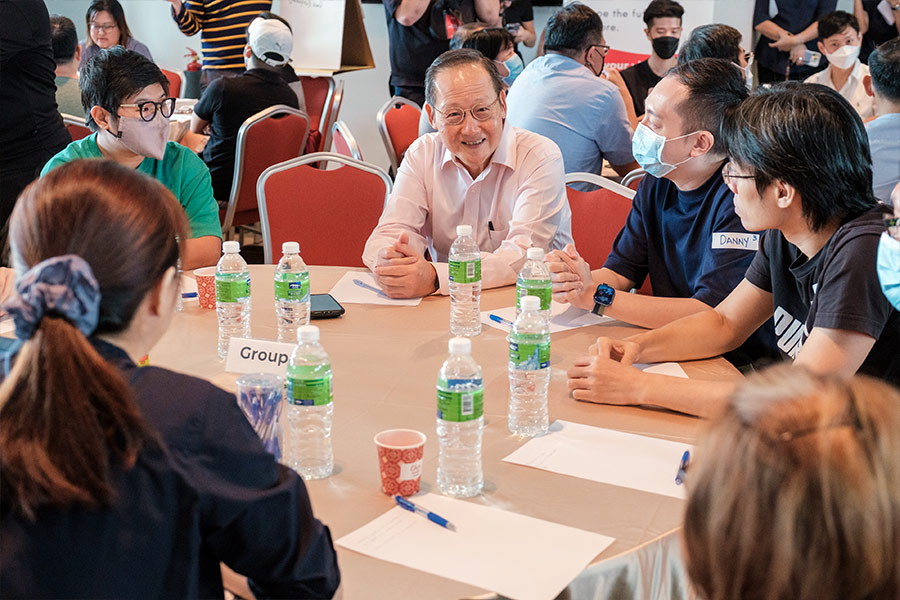
Minister Tan See Leng engaging in a small group discussion with PMEs
6. The Government is working with unions, employers, and labour market intermediaries to empower Singaporeans to take charge of their career health. As a start, the Government will launch the CareersFinder to support workers in their job and training search. CareersFinder taps on data and artificial intelligence to personalise recommendations on occupations, courses, and job openings to jobseekers.
|
“The Government should initiate tie-ups/collaborations with companies and provide incentives for companies who take on career switches.” – Respondent to the Empower Questionnaire (Nov – Dec 2022 |
7. The new Jobs-Skills Integrators will link up industry, training, and employment facilitation partners within three pilot sectors. These will ensure that training is relevant to industry needs, and facilitate better jobs and skills matches, with better employment outcomes for workers.
Supporting workers through job transitions
8. Some workers were worried about losing their jobs or their ability to work in the face of disruptions or setbacks. They were afraid that they would be left to fend for themselves. They felt that it would be less daunting for them to get back on their feet if there was stronger societal support.
|
“[The job search] was a pretty stressful experience... My previous company was closing down and [I] was told to leave. I went through 10 interviews. I have to find what is comfortable for me with different commitments that I have. Having no income scares me as I cannot find a new job when the job is ending.”
– Middle-aged worker at engagement at Lifelong Learning Institute, 14 Oct 2022 |
9. The Government is studying how to better support displaced workers through these challenging transitions, so that they can bounce back from career setbacks. The Government will carefully think through how to design re-employment support to provide an adequate cushion while workers search for jobs that fit their abilities or undertake training to upgrade their skills to improve their employability.
Professionalising Skilled Trades
10. Participants agreed that it was important to better recognise and reward skilled trades. They believed that a holistic approach was needed to professionalise such trades and change societal perceptions around the dignity and worth of these jobs. You and I can also show appreciation and respect to those in our community who are working in such trades.
11. The Government is partnering NTUC, and consulting tradespeople and relevant agencies, to explore redesigning skilled trades to offer better salaries, as well as clearer career and skill progression ladders, to better retain and reward workers.
|
“Appreciate, respect, educate. Every job matters. Public education allows people to see and learn that each job is dignified in its own way.”
– Respondent to the Empower Questionnaire (Nov – Dec 2022) |
Strengthening retirement adequacy
12. Participants also sought to be assured of meeting their retirement needs in their golden years.
13. The Government is studying how to strengthen support for retirement adequacy such that as long as one works and contributes consistently to one’s CPF, he will be able to meet his basic retirement needs. Recent changes such as the increase in contribution rates for senior workers and increase in the CPF monthly salary ceiling to $8,000 by 2026, will help with seniors’ retirement adequacy.
|
“Provide financial assistance, give higher CPF interest rates during the unemployment period so that their retirement funds will not be impacted by retrenchment...”
– Respondent to the Empower Questionnaire (Nov – Dec 2022) |
14. The Government will also do more to support employers with hiring senior workers, through measures such as extending the Senior Employment Credit and Part-time Re-employment Grant (PTRG) from 2023 to 2025. Many employers have successfully applied for the PTRG and committed to implementing progressive senior employment policies, which will benefit senior workers.
For more details on empowering Singaporeans throughout life, visit MOM’s COS webpage.
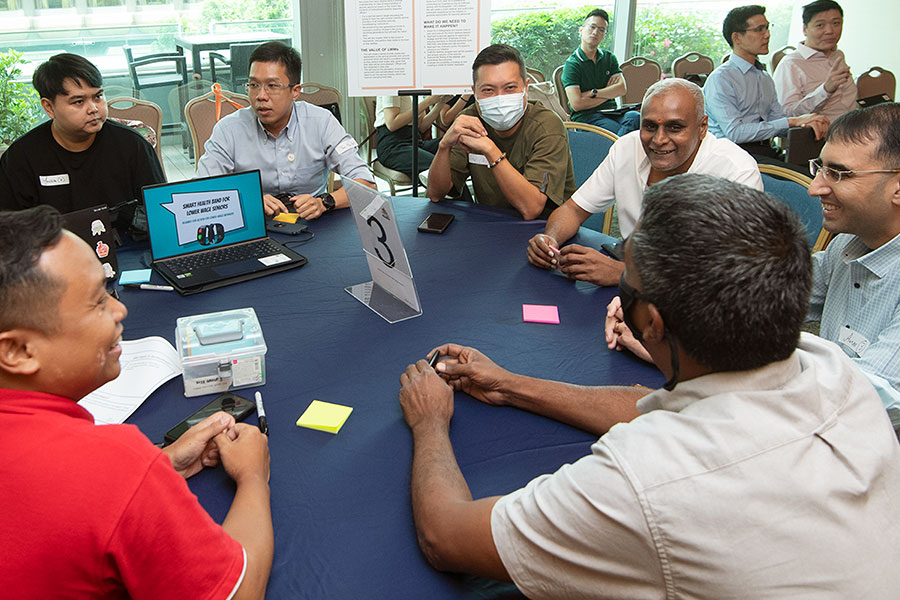
Participants at the Alliance for Action for Lower-wage Workers workshop exchanging ideas

Equip: Education and Lifelong Learning
Social mobility
1. Singaporeans recognise that for our children to do well in life, they need sound values, a supportive family environment, and access to good educational opportunities from an early age.
2. Many hoped that those who have benefited from the system can pay it forward, to uplift the rest of society, especially children from less advantaged backgrounds.
3. To this end, the UPLIFT Community Network will be expanded nationwide to support 1,300 students from disadvantaged backgrounds through partnerships between their schools and the community. Members of our society can also step forward in their own ways to give their time, skills and money to uplift and care for others.
Defining success
4. Singaporeans felt that our current definitions of merit and success are too narrow. Traditional yardsticks of success are still emphasised. These include performing well academically and securing a white-collar career, which is seen as better-paying and more prestigious.
|
“The idea of success has been passed down many generations. It has not changed since our parents and grandparents have defined the word… We hope that teachers, at the forefront of education, give kids the freedom, capacity, and will to express their own definition of success.”
– Participant at engagement at Singapore University of Social Sciences, 27 Sep 2022 |
5. Others shared that there are stark disparities in rewards and recognition across the job market. This disadvantages lower-wage workers and those who choose less conventional career paths.
6. Those who work with their “hands” (e.g. technicians) or “heart” (e.g. in service and community care sectors) wanted to be recognised for their contributions, make a decent living and progress in their respective fields.
7. We can better show our appreciation for the contributions each person makes, by paying everyone more fairly. The Government has revised salary guidelines for the social service sector to raise the salaries of workers in the sector and increase recognition of their work.
|
“Unless there is an alternative to how to quantify and qualify skills, we will still fall back on grades as a measure.” – Feedback collected at engagement with public officers, 21 Sep 2022 |
8. Many wanted to see our society embrace broader definitions of success – they felt that this would encourage Singaporeans to be more innovative, creative, willing to take risks, and grow to their fullest potential. Many shared stories of how they had followed their passions and made career switches, to pursue success in their own way.
|
“It is important to be satisfied with what you are doing. Primary and Secondary school trained us to work towards scoring 'A's and being in the top class, which gave us a lot of stress. Now, we view ourselves as successful because we are doing what we enjoy and can see ourselves continuing to do it in the future.”
– Student at engagement at the Singapore Institute of Technology, 29 Sep 2022 |
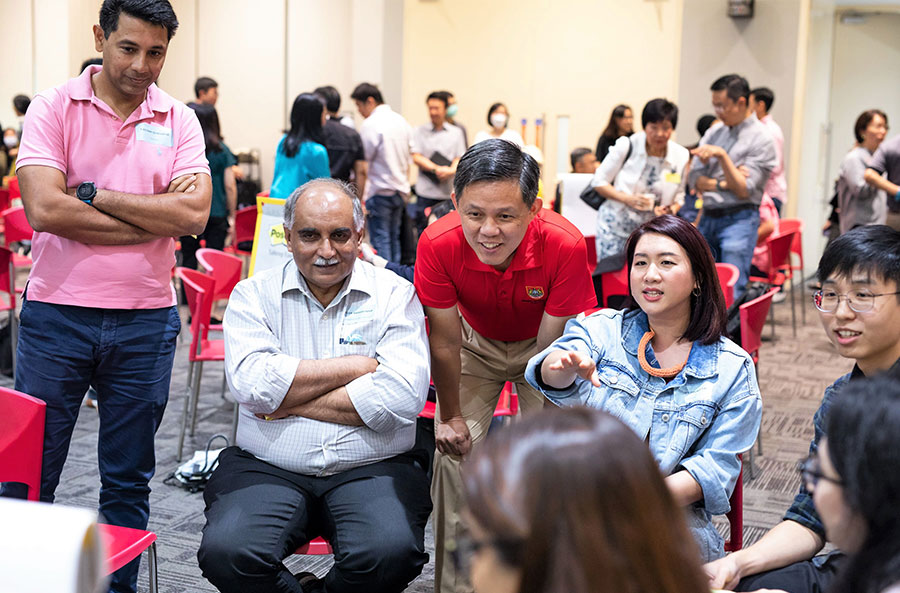
Minister Chan Chun Sing interacting with participants at the Forward Singapore Equip pillar engagement on education and lifelong learning
9. In response, the Government is implementing Full Subject-Based Banding in secondary schools and increasing access to polytechnics, as part of wider efforts to provide greater customisation and porosity in our students’ educational pathways.
10. The Government is also taking steps to reduce the emphasis on academic results, and to develop other competencies and students’ intrinsic motivation to learn. This year, the Government announced it will remove mid-year examinations for junior colleges and Millennia Institute progressively from 2024, and will make Project Work a “Pass/Fail” subject from the 2024 JC1/Pre-U2 cohort. The fourth content-based A-Level subject will only be included in the computation of students’ University Admission Score (UAS) if it improves their UAS, from Academic Year 2026 admissions.
Providing diverse opportunities
11. Singaporeans hoped to see a society where we embrace lifelong learning, including gaining greater industry exposure while they are in school, as well as upskilling throughout one’s career to progress throughout life.
12. The Government is doing more to encourage lifelong learning by increasing the Lifetime Cohort Participation Rate for publicly-funded university degrees. It is also encouraging the development of new degree pathways to cater to adult learners’ needs. This means that Singaporeans need not rush to frontload their education, as there will be more opportunities to study and upgrade to acquire new skills, knowledge, and qualifications later in life.
13. The Workplace Skills Recognition Programme, which will be piloted in the Food Services and Retail sectors, will also help workers gain formal certifications for skills they develop at the workplace.
|
“Everyone learns differently and has different abilities. Hence I feel that it is important to include everyone despite their learning abilities, and ensure that they will be given equal opportunities despite their differences.”
– Student at engagement at Temasek Polytechnic, 16 Aug 2022 |
14. Singaporeans agreed that we need a whole-of-society effort to empower persons with disabilities (PwDs) to fully realise their potential and participate as integral and contributing members of society. Having more supportive hiring practices, PwD-friendly workspaces, and specially designed job scopes that leverage the strengths of PwD employees, would go a long way towards realising that.
15. The Government will facilitate more meaningful partnerships between mainstream and Special Education schools, nurture inclusivity, and help students with special educational needs better integrate into society. As part of Budget 2023, the Government also enhanced the Enabling Employment Credit to encourage more employers to hire PwDs.
16. As part of the Enabling Masterplan 2030, PwDs, their caregivers and families, can also soon access community and employment support closer to their homes; the first Enabling Services Hub and Enabling Business Hub will be launched by mid-2023 and the second half of 2023 respectively.
17. Such broad moves across the education landscape will require the partnership of a wide range of stakeholders, including parents, the community, and industry.
For more details on equipping our people for progress throughout life, visit MOE’s COS webpage.
For more details on the Enabling Masterplan 2030, please visit MSF’s COS webpage.
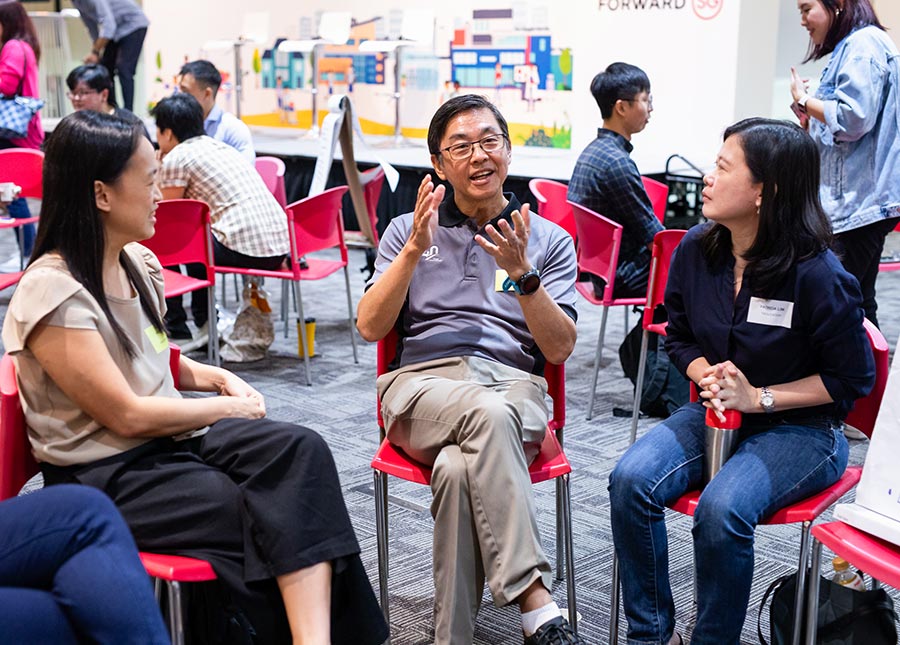
Participants exchanging views on their aspirations for education and lifelong learning at the Forward Singapore Equip pillar engagement

Care: Health and Social Support
Support for families
1. Singaporeans shared challenges they face in starting and raising a family. These included access to affordable housing, coping with increased cost of living, striking a balance between work and family, and meeting the caregiving needs of their young children and elderly parents.
|
“I work with young couples, and often they grapple with housing issues and work. Which also means they may not have the capacity to look into childcare development. Hence, it is important for various agencies to join hands to support and lighten the load of these young couples.”
– Feedback collected at engagement with social service professionals, 10 Oct 2022 |
2. Many participants wished to see more family-friendly workplace practices, and better sharing of parental responsibilities between husbands and wives.
3. To address some of these concerns, the Government announced at Budget 2023 an increase in financial support in the child’s early years. These include enhancements to the Baby Bonus Scheme and better support for parents to manage work and caregiving commitments, by increasing Government-paid paternity leave and unpaid infant care leave.
4. The Government, unions and employers are working together to develop the Tripartite Guidelines on Flexible Work Arrangements, to help Singaporeans manage their various responsibilities better.
5. The Government is strongly committed to supporting Singaporeans who wish to get married and have children. This requires a whole-of-society effort, from individuals and co-workers, to businesses, employers and community partners, and we will need to work together to build a Singapore Made For Families.
|
“Employers who hire older workers are given incentives. The same could be considered for flexible work arrangements. Many women who have children and aged parents to look after end up sacrificing their employment. Many of them want to work, but flexible work arrangements, while promoted by the Government, are often at the decision of their heads of department. More often than not, it is not granted which leads to a loss of manpower.”
– Feedback collected at engagement with social service professionals, 10 Oct 2022 |
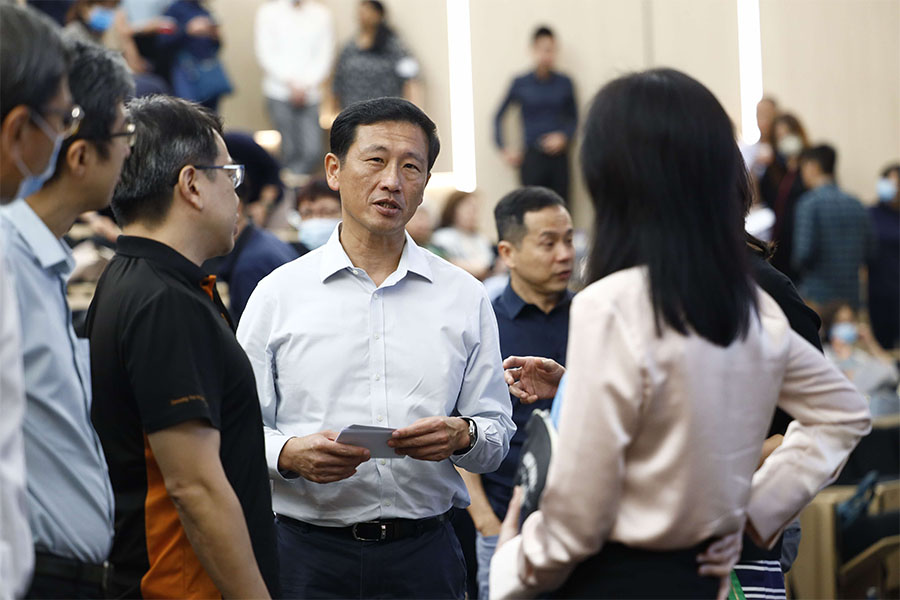
Minister Ong Ye Kung engaging attendees from the Active Ageing Centre providers on preparing for the next bound of aged care
| “Employers need to understand the need for remote work.” “There should be diaper changing stations in male toilets.”
– Feedback collected at engagement with public officers, 21 Sep 2022 |
Supporting vulnerable groups
6. Participants called for better support for less-advantaged families, so that pathways for upward mobility stay open to children from these backgrounds. Some called for social services to be delivered in a more seamless and family-centric way.
|
“Moving up the social ladder starts from going to the ground, helping these families, getting to know them, not seeing them just as a level of people, but their stories, what happened to them, their circumstances.”
– University student at engagement on social mobility with students from Institutes of Higher Learning, 15 Nov 2022 |
7. The Government is making efforts to integrate service delivery across agencies, so that social services can be delivered seamlessly and effectively to those who need it. The social services sector also needs more support from volunteers and befrienders, as empathy and personal connection are crucial when reaching out to families through initiatives such as ComLink.
|
“I tutored children from rental housing estates. The parents don't have the luxury of time. As a tutor, it was not part of my job scope, but I kind of became a mentor for them because I thought that if no one's going to do it, then perhaps I will.”
– University student at engagement on social mobility with students from Institutes of Higher Learning, 31 Jan 2023 |
8. Others called for more support for children with special needs and their families, such as better access to early intervention and good educational opportunities.
9. Participants agreed that all stakeholders in society should play a part to uplift families in need, and ensure that no one is left behind.
10. We want all families to be resilient and confident in their future. Lower-income families can be empowered to take active steps to uplift themselves and help fellow families in need. To support lower-income families and their children towards Stability, Self-reliance, and Social mobility (3 ‘S’), the Government is scaling up initiatives such as ComLink and KidSTART, and has made top-ups to the ComCare Endowment Fund at Budget 2023.
|
“What motivates me is my 16-year-old son. I want to show him that despite our problems and illnesses, I am still standing strong for both of us. We are not alone. The government’s provision of help is there. We can all help one another by sharing resources with those around us.”
– FSC and SSO beneficiary, and a participant at SG Cares Community Network Session (SGCCN) @ Bukit Batok, Bukit Panjang and Choa Chu Kang, 18 Nov 2022 |
|
“When I needed help, somebody came to help me. But now, I give back. Anybody who wants my help, I will help and ask them what they need. I give back to my neighbourhood FSC, Bukit Batok. I volunteer, and if I can help with the problem, I will do it. If I cannot do it, I will find somebody like SSO or FSC or any MP, I will bring them there and try to get help for them. When others see you helping, they will follow you. Standing together and help other people.”
– FSC and SSO beneficiary, and a participant at the SG Cares Community Network Session (SGCCN) @ Bukit Batok, Bukit Panjang and Choa Chu Kang, 18 Nov 2022 |
11. Children below seven years old with developmental needs will get more timely and affordable support with the additional 1,400 places in two new early intervention centres and the Enhanced Pilot for Private Intervention Providers programmes. One centre will be ready at the end of this year, and the other by mid-2024.
|
“A takeaway from today would be the need to shift to a giving approach and assess how we may shift giving in a manner that can be sustained. For example, it would not look like a one-off occasion of doing something for the community but moving towards the community providing sustained help toward those who need it. It could look like a family taking care of 1-2 elderly individuals in the same block. If we were to shift mindsets this way, it would reduce the reliance on services and give more people the autonomy to be the change.”
– Representative from Family Service Centre at engagement with social service professionals, 10 Oct 2022 |
For more details on efforts to support families, visit MSF’s COS webpage, or refer to the Budget 2023 Families infographic and the Made for Families infographic.
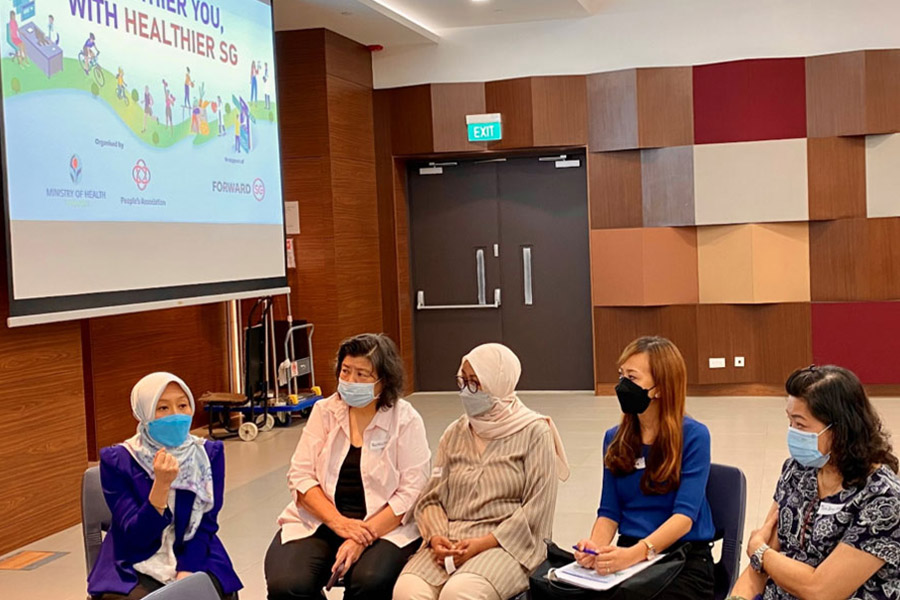
Senior Parliamentary Secretary Rahayu Mahzam speaking to representatives from the Women’s health and wellness groups

Build: Home and Living Environment
Housing aspirations
1. Participants agreed that Singapore should continue to be a home-owning society. They felt that our public housing policies should support the needs of families, prioritise genuine homeowners, and promote social cohesion. Our housing policies should also keep pace with Singaporeans’ evolving needs and aspirations.
2. At the same time, Singaporeans acknowledged our land and space constraints, and the challenges these constraints pose to meeting housing aspirations and needs.
|
“On one hand, young Singaporeans expect affordable BTO prices, but on the other hand, Singaporeans expect the prices of their houses to go up so that they can sell it for a profit and upgrade to private property. I wonder how the HDB is going to balance these contrasting aspirations.“ – Participant at Forward Singapore Conversation @ Pasir Ris-Punggol, 4 Dec 2022
|
3. Young adults and couples were concerned about whether they can access affordable public housing, especially given the current high application rates for BTO flats and a buoyant resale market.
|
“Do we want to prioritise housing for first timers and new families so that they can have a home to start their own family, and at the same time, how do we weigh that against singles that may not necessarily be getting married and having kids but are still contributing members of society? At the same time, do we only prioritise segments of society that are contributing to the country, and what about those who, due to their circumstances, may be disadvantaged? We need to ensure we do not leave them behind.” – Youth at engagement with young working adults on public housing, 20 Nov 2022
|
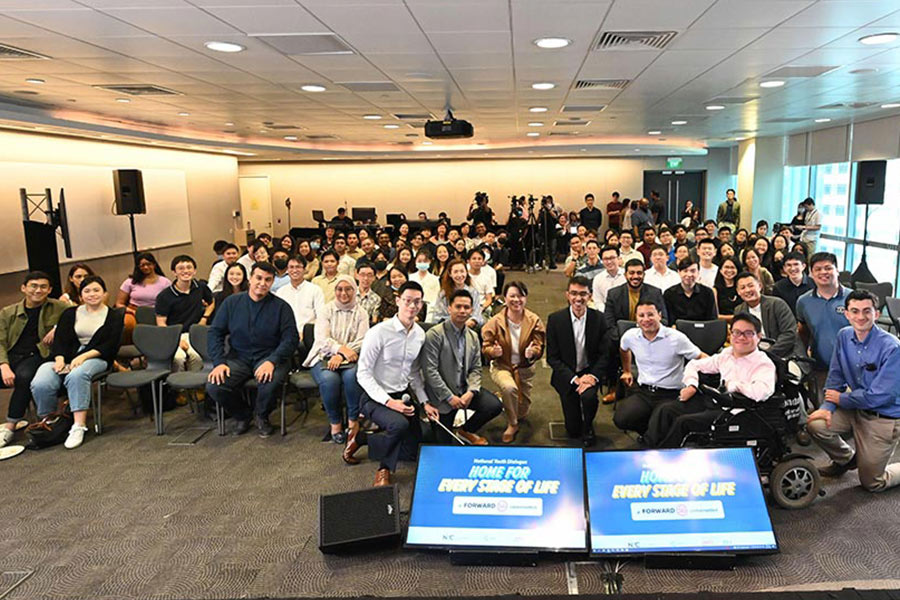
Minister Desmond Lee and distinguished speakers discussed housing issues in Singapore with youths during a Forward Singapore dialogue
4. Older Singaporeans had different preferences: some desired to age in place, and shared that their flats can be better equipped with elderly-friendly features, with access to integrated care services. Others wanted to right-size or access housing options that would meet their care needs.
5. Singles wanted to have their own space and privacy, especially with the growing prevalence of remote working arrangements.
6. Participants generally agreed that priority should be given to first-timers who are looking to purchase their first home. They also acknowledged even within the first-timers group, there could be some segments that face more urgent housing needs, and may need to be given more support and priority.
7. In response, the Government increased support to help first-timers achieve their housing aspirations. Families with children and young married couples applying for their first home will receive additional ballot chances. The Government also increased the CPF Housing Grant to improve the affordability of resale flats for first-timer families and singles. For seniors, the Government will be launching a third Community Care Apartment project in Bedok later this year, and is working on a future pipeline of Community Care Apartments in different locations across Singapore.
A more inclusive transport system
8. Participants were generally proud of and satisfied with Singapore’s public transport system. They recognised our land constraints and were supportive of going car-lite.
9. They agreed with prioritising Walk-Cycle-Ride modes of transport, as well as moving towards greater reliance on public transport and active mobility, which are the most sustainable ways to commute. There was broad support to repurpose road space to prioritise pedestrians, public transport and active mobility over private vehicles.
|
“Infrastructure-wise, [we] should also focus more on walking and cycling rather than private modes [of transport]. [We should] have safer street(s)… and should reflect the focus on active mobility.”
– Working adult at engagement on shaping our land transport system, 23 Sep 2022
|
10. Participants called for our public transport to be made even more inclusive. They were willing to accept some inconveniences that come with making our transport infrastructure more friendly to seniors and persons with disabilities.
|
“Transportation needs to be future ready. How will an ageing population travel about in the future?”
– Participant at engagement with public officers, 21 Sep 2022 |
11. The Government will pilot “Friendly Streets” to make our neighbourhoods more inclusive and conducive for Walk-Cycle-Ride journeys, and to foster more gracious behaviours in our communities. These streets will have features such as widened footpaths, cycling paths, more greenery, traffic calming and new pedestrian crossings, which will be easier and safer for people to use. The Government will also engage the community to co-create specific features at each location, so that each Friendly Street will be tailored to meet the needs of the local community. We can all do our part to be gracious and responsible users of the streets where we live, work, and play.
Helping seniors age well in the community
12. Participants shared ideas on how seniors can better age in the community, with appropriate care and social support as well as upgrading existing homes to make them more senior-friendly. The Government will continue to explore ways to catalyse innovation and facilitate more options for seniors to age confidently in their homes and in the community.
|
“If possible, I would prefer to stay in my own place unless I really do not have a choice.”
– Single mother in her 40s at an engagement with pre-seniors and seniors on ageing in the community, 17 Feb 2023 |
13. Part of ageing well also includes opportunities to contribute meaningfully and remain socially engaged. Participants shared their motivation for volunteering and ideated on how to encourage more seniors to contribute to the community and age actively through volunteerism.
|
“I think meeting different seniors as I volunteer to see how they're ageing is a good learning point. It's an opportunity for me to be inspired by the way other seniors are living their lives and channel that into my own ageing journey.” “I chose to volunteer as a Silver Generation Ambassador as I would like my grandchildren to follow after me to volunteer too.”
– Senior volunteers at an engagement with Silver Generation Ambassadors, 6 April 2023 |
For more details on improving our built environment, visit MND’s COS webpage and MOT’s COS webpage.
For more details on supporting our seniors to age in the community, visit MOH's COS webpage.
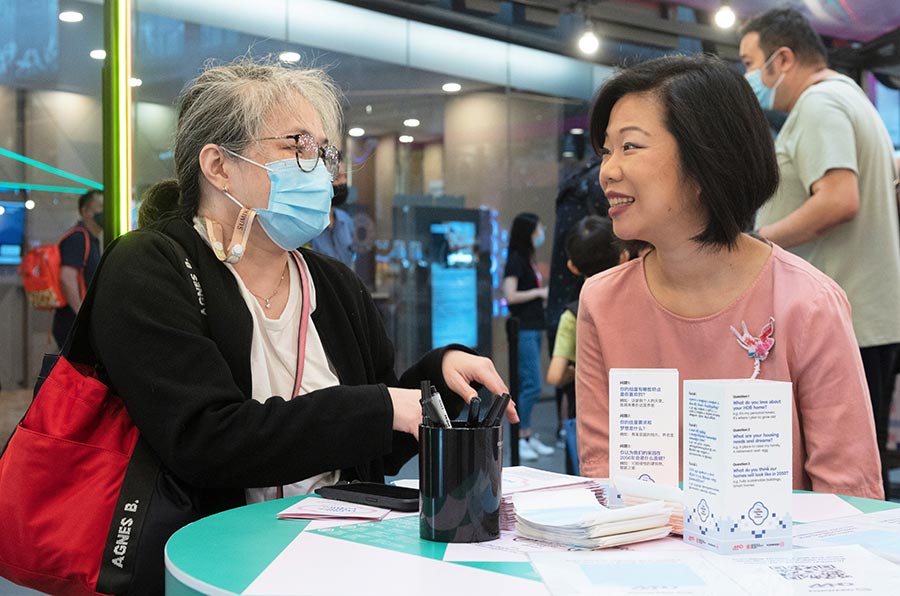
Senior Minister of State Sim Ann speaking to a member of the public at the roadshow on 6 November 2022. (Credit: MCI / Syafiq)

Steward: Environmental and Fiscal Sustainability
A sustainable Singapore
1. Participants agreed that everyone must do their part to build a green, liveable and climate-resilient Singapore for future generations.
2. There was broad consensus on the need for a mindset shift across all segments of society to adopt more environmentally-friendly behaviours. For example, the implementation of the Disposable Carrier Bag Charge at large supermarkets aims to encourage citizens to adopt more environmentally-sustainable habits and lifestyles, as we collectively work towards our journey towards a Zero Waste nation.
|
“The narrative for Singapore to be more environmentally sustainable needs to be more consistent across all parts of society. Currently, it is very consumer-centric. Use less straws. Use less bags. What about narratives that involve organisations? Organisations need to do their part. What about the narrative that involves the Government? Is the government consistent with its actions to preserve green spaces? What about public sector processes, i.e. procurement?”
– Feedback collected at engagement with public officers, 21 Sep 2022
|
3. The Government will publish an annual report on its sustainability efforts from Financial Year (FY) 2023. All statutory boards will also make their annual environmental sustainability disclosures from FY2024. To drive green procurement in the public sector, up to 5% of evaluation points for environmental sustainability will be set aside for large Government construction and information and communications technology tenders.
4. There were many suggestions for stronger incentives or disincentives to drive environmentally-friendly behaviour. Many participants said they were prepared to bear with some inconveniences or pay more for environmentally-friendly goods and services.
5. They also felt that better infrastructure that makes sustainable practices more convenient, would help to change people’s behaviours. For example, the Government will provide a Bloobox to all Singapore households to set up recycling corners at home. For businesses, the Energy Efficiency Grant and Energy Efficiency Fund will support SMEs in eligible sectors with adopting energy-efficient equipment.
|
"People understand the importance of recycling. But this doesn’t often translate to behaviour change due to inconvenience and short-term mindsets."
– Participant at Forward Singapore Intergenerational Conversation, 3 Dec 2022
"Provide incentives to those who had contributed to the Green Plan 2030, such as the Healthy 365 app where incentives could be redeemed after completing some challenges.”
– Participant at Forward Singapore Conversation @ Marsiling-Yew Tee, 8 Oct 2022 |
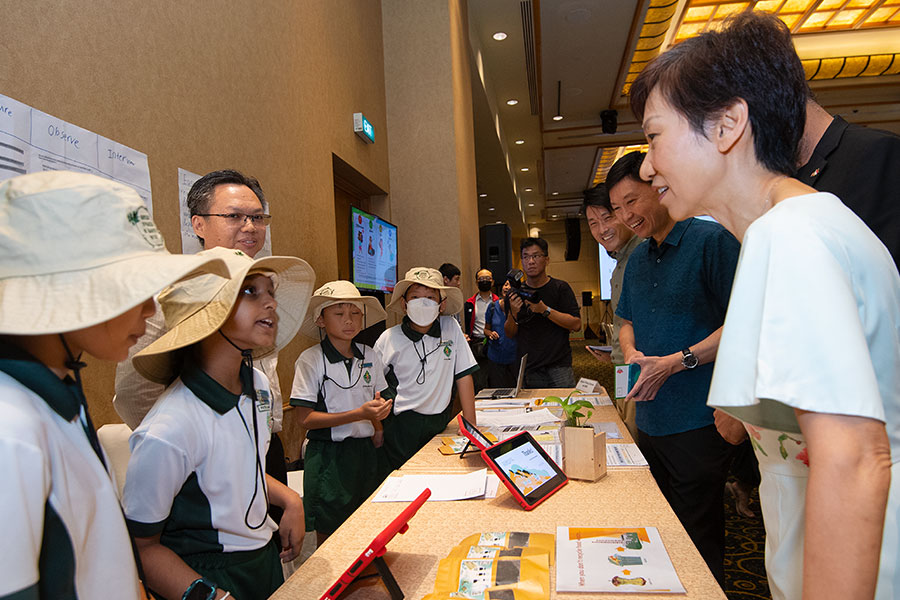
Students from Xingnan Primary School sharing their environmental project with Minister Grace Fu
6. While participants generally resonated with Singapore’s climate ambitions, such as our target for a net-zero economy, they felt that these goals and the trade-offs involved can be communicated more simply, so that everyone can understand and rally behind them.
7. Participants acknowledged the need to manage the transition to net-zero carbon emissions at a suitable pace, so that we can meet our climate ambitions while we remain economically competitive.
Funding diverse needs
8. Participants acknowledged that, with finite fiscal resources, the Government has to balance the diverse needs and aspirations of different groups, and ensure a fair and considered allocation of funding across various policies and schemes. Budget 2023 further enhanced the progressivity of our system of taxes and transfers, to ensure that those with greater means contribute more, and support goes to those who need it most.
For more details on efforts to build a green, liveable and climate-resilient Singapore, visit MSE’s COS webpage.
For more details on funding our diverse needs, visit MOF’s Budget webpage.
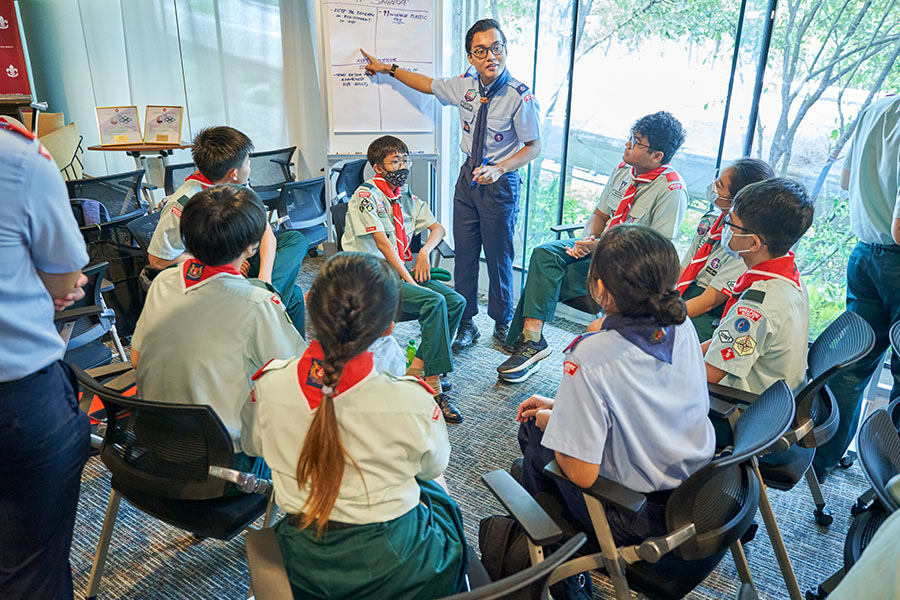
Participants from the Singapore Scout Association brainstorming on how they can do their part for the environment

Unite: Singapore Identity
1. Some participants emphasised the importance of articulating a clear Singaporean identity, while others pointed out that what it means to be a Singaporean will continue to evolve, with diverse interpretations across society.
|
“It’s hard to feel a sense of belonging or ownership if you don’t fit into the template Singaporean narrative... We can craft a wider narrative [of what makes a Singaporean], but this will be increasingly difficult as Singaporeans become more diverse."
– Participant at engagement with public officers, 21 Sep 2022
|
2. Singaporeans called for society to come together to guard our multiculturalism and embrace diversity. There was consensus that mutual respect and understanding for each other’s traditions and cultures is necessary for societal harmony. To this end, Singaporeans should stay curious and learn more about our different cultures, and be more gracious towards one another.
3. Under the Our Singapore Heritage Plan 2.0, the Government will partner Singaporeans to co-create more cultural festivals and exhibitions, and foster a deeper understanding of our diverse cultures.
|
“[It’s] hard to know your neighbour. We should bring back the kampong spirit. Have more block parties… but [it’s] hard to get the people to come.” – Participant at Forward Singapore Intergenerational Conversation, 3 Dec 2022
|
4. Many Singaporeans were enthusiastic about playing a bigger role in shaping our future. Participants expressed interest to:
a. Contribute ideas and shape policy at both national and local levels, to foster a greater sense of community and national identity. For example, the Government will extend the Our Singapore Leadership Programme to more youths, to enable them to come together and discuss key issues which confront Singapore.
b. Participate in new engagement and partnership forms, such as Alliances for Action and the use of Open Space Technology, where participants can lead discussions and propose ideas to address issues they are passionate about.
c. Give back to society in various ways, with their resources, time, and effort. The Government is helping to foster this culture of giving back by encouraging individual and corporate volunteerism through various tax incentives.
5. Participants agreed that closer collaboration and partnership between the Government and other stakeholders in society – businesses, the community, and individual Singaporeans – would be essential in the next phase of our nation-building.
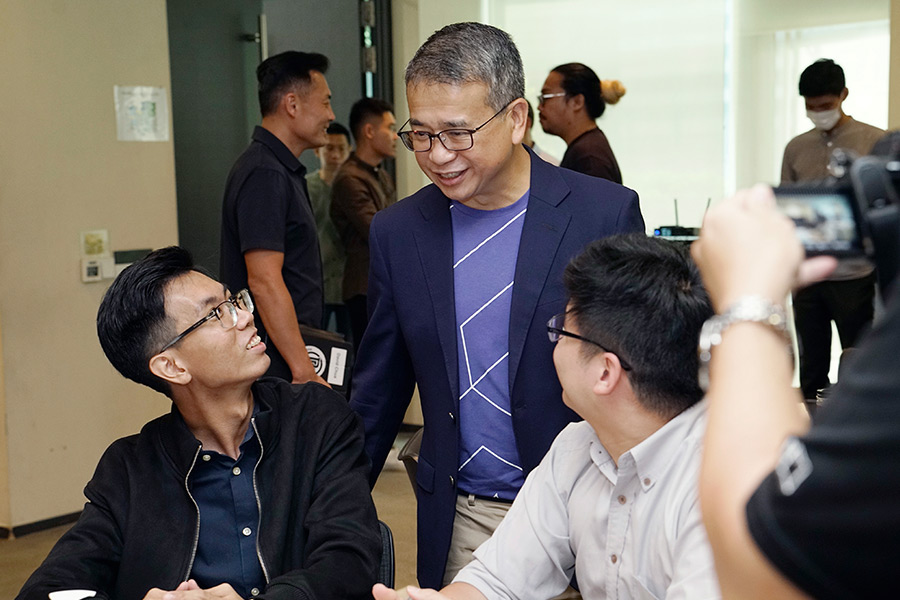
Minister Edwin Tong engaging youth leaders on the challenges in building and maintaining social cohesion
|
“We need more than just safe spaces to hold dialogues, we need spaces where we can be brave and dare to disagree and take risks in prototyping new social possibilities; so we will not be victims of our own success(es).”
– Youth leader at Forward Singapore National Youth Dialogue, 23 Jul 2022 |
6. By overcoming crises and seizing new opportunities together, Singaporeans hope to build a more united and resilient Singapore. They also aspire towards a society that is more caring and inclusive, where everyone is treated with dignity and respect regardless of their backgrounds.
For more details on building a more united and cohesive Singapore, visit MCCY’s COS webpage.
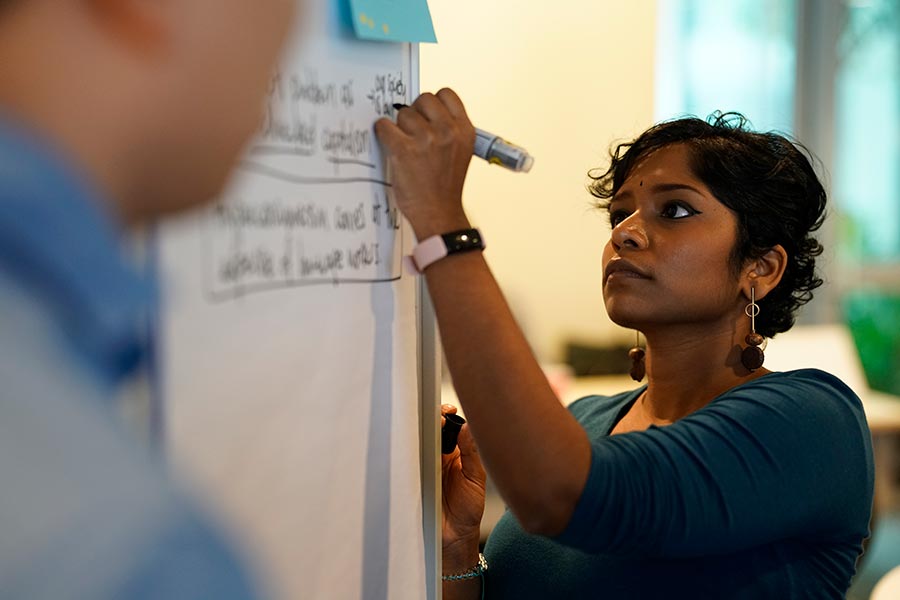
Discussions amongst youth leaders about tackling important national issues





